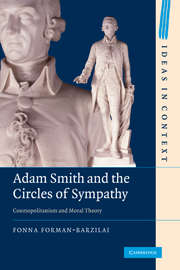Book contents
2 - Sympathetic self
Published online by Cambridge University Press: 03 May 2010
Summary
'Tis with our judgments as our watches, none go just alike, yet each believes his own.
Alexander Pope, Essay on CriticismIn Chapter 1, we examined Adam Smith's resistance in the Moral Sentiments to deducing all moral sentiment from “certain refinements of self-love.” From the opening lines of his treatise, Smith distinguished himself from Mandeville and from other eighteenth-century attempts to “socialize” or “commercialize” Hobbesian assumptions about human nature. Smith rejected not only the claim that men were thoroughly selfish beings, but he also rejected the corollary claim made by many of his contemporaries that any “society” to be found among them was but a by-product of enlightened selfishness. Men were not wholly selfish for Smith but in fact deeply conflicted, ever struggling to negotiate conflicts that emerged in life between their selfish and social appetites. We discovered that Smith identified a certain faculty inside of us that assists us as we adjudicate practical conflicts between our selfish and social tendencies, helping us to resolve them in the direction of sociality. In Chapter 1, I introduced Smith's account of the conflicted self. Here I begin to explore the adjudicating faculty Smith identified. He claimed that “to direct the judgments of this inmate is the great purpose of all systems of morality.” But what was this “inmate”? Where did it come from? How did it work?
- Type
- Chapter
- Information
- Adam Smith and the Circles of SympathyCosmopolitanism and Moral Theory, pp. 56 - 72Publisher: Cambridge University PressPrint publication year: 2010

